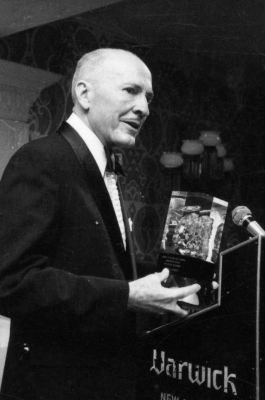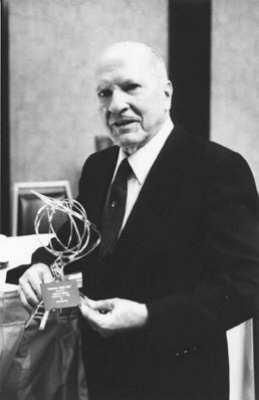The Golden Age of Science Fiction: Robert A. Heinlein
The Forry Award has been presented annually by LASFS (the Los Angeles Science Fantasy Society) since 1966 and is named for Forrest J Ackerman. The award celebrates lifetime achievement in science fiction and the recipients are selected by a vote among LASFS members. The first award was presented in 1966 to Ray Bradbury and has generally been presented to science fiction professionals, although an occasional fan has received the award as well. Ackerman didn’t receive the award until 2002. Robert A. Heinlein received the award in 1980. The award was presented at Loscon 7, the weekend of November 28-30 at the Anaheim Sheraton.
Books have and will continued to be written about Robert A. Heinlein, some recent examples being William H. Patterson’s two volume Heinlein biography and Farah Mendlesohn’s The Pleasant Profession of Robert A. Heinlein. From 1979, there was H. Bruce Franklin’s Robert A. Heinlein: America as Science Fiction, which I discussed on May 6. Of course, Heinlein also has his staunch devotees and partisans as well as his detractors.
Rather than attempt to recount Heinlein’s life and career, I’m going to discuss a few specific works of his. I was introduced to Heinlein, as so many were, by the juveniles, many of which left a lasting impression, if not of the entire books, of specific details. I wanted to learn cribbage since Heinlein’s characters played it in Tunnel in the Sky, I though the idea of Time for the Stars was wonderful, although in retrospect the final relationship is rather creepy. At a young age, I somehow managed to acquire a first edition of Rocketship Galileo. Being a long time Hadeophile, Have Spacesuit—Will Travel has always had a special place in my heart, but my favorite of Heinlein’s juveniles has always been Citizen of the Galaxy. Interestingly, with the exception of Rocketship Galileo, his juveniles that left the biggest impression on me were his final four.
In Citizen of the Galaxy, Heinlein follows his protagonist, Thorby, through many years and social castes, allowing Thorby’s understanding of ethics to change and Heinlein to explore whether morals are relativistic or not. The universe Thorby moves through is general vicious and uncaring about him, allowing Heinlein’s one time slave to find his own inner Heinleinian superman.
I’m less fond of Heinlein’s non-juveniles, although I’ve read them all. Heinlein won four Hugo Awards, for Double Star, Starship Troopers, Stranger in a Strange Land, and The Moon Is a Harsh Mistress (he won a retro-Hugo for Farmer in the Sky). Of those, in fact, of all his non-juveniles, my favorite novel is The Moon Is a Harsh Mistress.
While Heinlein espouses a complex political system in The Moon Is a Harsh Mistress, the book also stands up as a riveting novel in which a machine which can easily pass a Turing helps spur along all the action, relying on humans to carry out its plans. While the HOLMES IV, in its guises as Mycroft and Adam Selene can calculate the odds of the revolution succeeding and guide it to a certain point, the computer is not a deus ex machine and just as human characters Mannie, Wyoh, and Bernardo grow disillusioned with the revolution they and Mike kicked off, the future isn’t quite what the computer expected, either.
While some of Heinlein’s work has not dated well, other works by Heinlein have stood the test of time. His own reputation is currently in a tug-of-war between those who revere him and those who feel that he represents an out-dated science fiction. The truth is somewhere in the middle and Heinlein’s writing and vision of science fiction continue to influence where science fiction is and where it is going as some authors build on his work and others write in reaction to him.
The Forry Awards do not list a slate of candidates for consideration, so it is not know who else LASFS looked at for the award in 1980. The previous year’s award was given to Jerry Pournelle, while the following year editor Horace L. Gold was recognized for his influence on the field.
 Steven H Silver is a sixteen-time Hugo Award nominee and was the publisher of the Hugo-nominated fanzine Argentus as well as the editor and publisher of ISFiC Press for 8 years. He has also edited books for DAW, NESFA Press, and ZNB. He began publishing short fiction in 2008 and his most recently published story is “Webinar: Web Sites” in The Tangled Web. His most recent anthology, Alternate Peace was published in June. Steven has chaired the first Midwest Construction, Windycon three times, and the SFWA Nebula Conference 6 times, as well as serving as the Event Coordinator for SFWA. He was programming chair for Chicon 2000 and Vice Chair of Chicon 7.
Steven H Silver is a sixteen-time Hugo Award nominee and was the publisher of the Hugo-nominated fanzine Argentus as well as the editor and publisher of ISFiC Press for 8 years. He has also edited books for DAW, NESFA Press, and ZNB. He began publishing short fiction in 2008 and his most recently published story is “Webinar: Web Sites” in The Tangled Web. His most recent anthology, Alternate Peace was published in June. Steven has chaired the first Midwest Construction, Windycon three times, and the SFWA Nebula Conference 6 times, as well as serving as the Event Coordinator for SFWA. He was programming chair for Chicon 2000 and Vice Chair of Chicon 7.


If even those opposed to you still feel the need to react to you over thirty years after your death…well, no further arguments about your importance or continuing relevance need be made.
I’ve been doing a series of posts on Heinlein juveniles. This week it’s Rocket Ship Galileo. I’m enjoying the rereading. I didn’t start out rereading them in order, but am now filling in the gaps. Most, but not all, are available in ebook format. Otherwise, it’s find a paperback copy.
[…] Heinlein (Black Gate): In Citizen of the Galaxy, Heinlein follows his protagonist, Thorby, through many years and social […]
My sf/f reading group did The Moon is a Harsh Mistress and we did enjoy reading it. We are looking at Alec Nevala-Lee’s Astounding for our July book, so we may have some interesting opinions on RAH and his interactions with John W. Campbell and the other “Golden Age” writers (Isaac Asimov, L. Ron Hubbard) that Mr. Lee profiles.